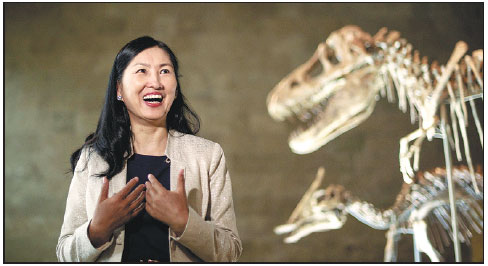Mongolia sinks teeth into fossil theft
Government mounts campaign to end smuggling and reclaim long-lost relics
For years, herder Gelegrash had a sideline bringing tourists to see a dinosaur skull hidden near the Flaming Cliffs in Mongolia's Gobi Desert. Then, one day, it was gone.
It is one of thousands of ancient fossils that have disappeared from the country since US citizen explorer Roy Chapman Andrews - supposedly the inspiration for the movie character Indiana Jones - discovered dinosaur eggs there nearly a century ago.
Paleontologists and smugglers alike have descended on the sands ever since.
Now the Mongolian government is mounting a campaign to reclaim the lost relics, hoping to bring home fossils long held in foreign museums and the curiosity cabinets of private collectors - such as Hollywood star Nicolas Cage - who pay hundreds of thousands of dollars for them on the open market.
In his yurt near the red sandstone cliffs, Gelegrash laughed about the skull's potential value: "If I had known it was worth so much, I would have sold it myself."
The dinosaur repatriation drive began when the husband of the country's then culture, sport and tourism minister Oyungerel Tsedevdamba learned a New York auction house was to sell a rare, nearly complete Tarbosaur bataar specimen - a smaller, fiercer cousin of Tyrannosaurus rex.
Paleontologists confirmed that all known specimens of the reptile had come from Mongolia's Nemegt basin, raising the question of how it ended up in Manhattan.
Removing fossils from the country is illegal, but "nobody knew what to do exactly", Oyungerel said. "Nobody had claimed dinosaurs from abroad before."
Since Chapman Andrews' discovery, hundreds of expeditions have traveled to Mongolia to look for fossils, some with official blessing, others digging them out illegally and smuggling them out of the country.
It is nearly impossible to prevent thefts from Mongolia's vast steppe, said Surenjav Munkhsaikhan, 31, who manages the national park where Chapman found the eggs.
She is the only full-time guardian of over 10,000 hectares of fossil-rich desert, working with police and her volunteer deputy Gelegrash to combat crimes ranging from illegal mining to the theft of rare plants.
She patrols the area on an old motorbike, but "really wants some drones", she said.
For now the only way she knows a fossil has been stolen is when customs agents catch a smuggler, or one of Gelegrash's fellow herders complains about losing their source of income.
"We never caught or arrested any of those thieves," she said.
The Tyrannosaurus Bataar in New York - estimated to be 70 million years old - was far from the first fossil to leave Mongolia, but quickly captured the national imagination, and Mongolia's President Tsakhiagiin Elbegdorj took the case directly to the US government.
In 2012, a US federal prosecutor filed a lawsuit seeking the forfeiture of the relic from the firm that auctioned it. The case ended in victory - two years after the suit was filed, the fossil headed home to Mongolia.
More importantly, the ruling was an important step toward undermining the entire underground trade, Oyungerel said.
Mongolia has since recovered around 30 fossils "directly from the smugglers' hands", Oyungerel said.
Some collectors have also begun to return their fossils voluntarily, among them Cage, who bought his T. bataar skull at auction for $276,000 before learning it had been smuggled out of Mongolia.
Authorities were once slow to recognize the value of Mongolia's paleontological heritage, according to Oyungerel, while Mongolians regarded dinosaurs as "just bones".
But last year, a museum dedicated to the recovered specimens opened in the Mongolian capital Ulaanbaatar's former Lenin museum.
Surenjav and Gelegrash hope that the fossils can one day return to their original resting place in the Mongolian desert.
The herder admits the campaign has changed his perception of dinosaur remains.
He used to value them for a different use: "They're good for health," he said, as he poked at a small, white fossil sticking out of the red earth. "I sometimes ground them up and gave them to my livestock."
|
Oyungerel Tsedevdamba, Mongolia's former minister of culture, sport and tourism, is interviewed in front of the Tyrannosaurus Bataar in a museum.Johannes Eisele / Agence Francepresse |



















